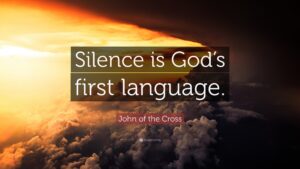Editor’s note: Due to the 4th of July holiday, a full newsletter was not completed this week. The regular format will return next week. In lieu of the newsletter, I’d like to share two pieces which are important to me. The first is an article I wrote about my brother, his death, and one of the things I wished I had unlearned while he was still alive. The second is a post I feel should accompany every “Friday Future Five”–for before we think about the future, we must first strive not to think. The following post explains in greater detail. I hope you enjoy and have a blessed Holiday weekend.

If we are to think about the future and do it well, I have one piece of unconventional advice as a long-time professional futurist–Don’t. That is, don’t try to think about the future. First, become grounded in the present and learn to meditate.
The practice of meditation takes a lifetime to master and I certainly don’t claim to be anywhere near skilled in the art. The reason meditation is vital to discerning the future is that it strives to clear the mind.
This state of “non-thought” is essential because if you think about it–I mean really think deeply–every thought we have has been informed by our past learnings, experiences, and memories. In this sense, all of our thoughts and knowledge pertains to the known. We, however, are interested in the future–the unknown.
Therefore, if we are to think as clearly as possible about the unknown future, we must seek to let go of everything. We must let go of what we know and what we think we know. We must let go of our assumptions, opinions, habits, beliefs, as well as our certainties and uncertainties. We must also let go of our worries, anxieties and fears about the future.
It is only in this state of complete unknowing that we can truly be free–fully free to explore all the vast and rich potentialities of the future. This freedom must also include being free of conclusions. For once we have reached a conclusion about the future, it is only natural that thought takes over and we become mechanical in our approach to the future.
Meditation, however, allows insights to arise from within and it is these insights which we are seeking because they represent a new kind of creative energy.
I recently had the opportunity to watch After Antarctica. It is an extraordinary documentary about the well-known Arctic explorer Will Steger. At one stage of his daunting journey, Steger speaks about being in a “spiritless state of mind.”
Now, such a “spiritless” state might seem to be depressing at best; and, at worst, something to be avoided at all costs. It isn’t.
As a Celtic Christian, I have often found myself pondering over the meaning and the wisdom in the Second Beatitude in the Sermon on the Mount in which Christ declares, “Blessed are the poor in spirit for theirs is the kingdom of God.”
I am not trying to evangelize here and you don’t have to be a Christian or even be a believer in a higher power–although others may call it “the Great Mystery,” “the Divine,” “the Holy Spirit,” “Providence,” etc.–to grasp the idea that whatever is beyond our “knowing” might be best approached in a nakedly open and “spiritless” state of mind. (John of the Cross has a beautiful quote that also captures this idea: “In this nakedness the spirit finds rest, for when it covets nothing, nothing raises it up and nothing weighs it down.”)
For it is only in this “spiritless” state of mind that we can approach something akin to “the thought beyond our thoughts.” In secular terms, this “thought beyond the thought” or “unknown known” may be considered and even described as a type of creative energy. For all I know, it may even be a life force in its own right. (Personally, I have a sneaking suspicion that the “thought beyond our thoughts” is love but I can’t prove this notion.)
Yet, it is this “creative energy” we must tap into if we are to successfully probe the future. Moreover, this “creative energy” is what we must leverage if we are to forge a better, bolder and brighter future.
If I had to summarize, I would say this: Meditation allows us to clear our minds. This freedom of mind allows us to best approach the “thought beyond the thought.” This “thoughtless thought” is a creative energy and if we can tap into it we can and we will create a better future.
